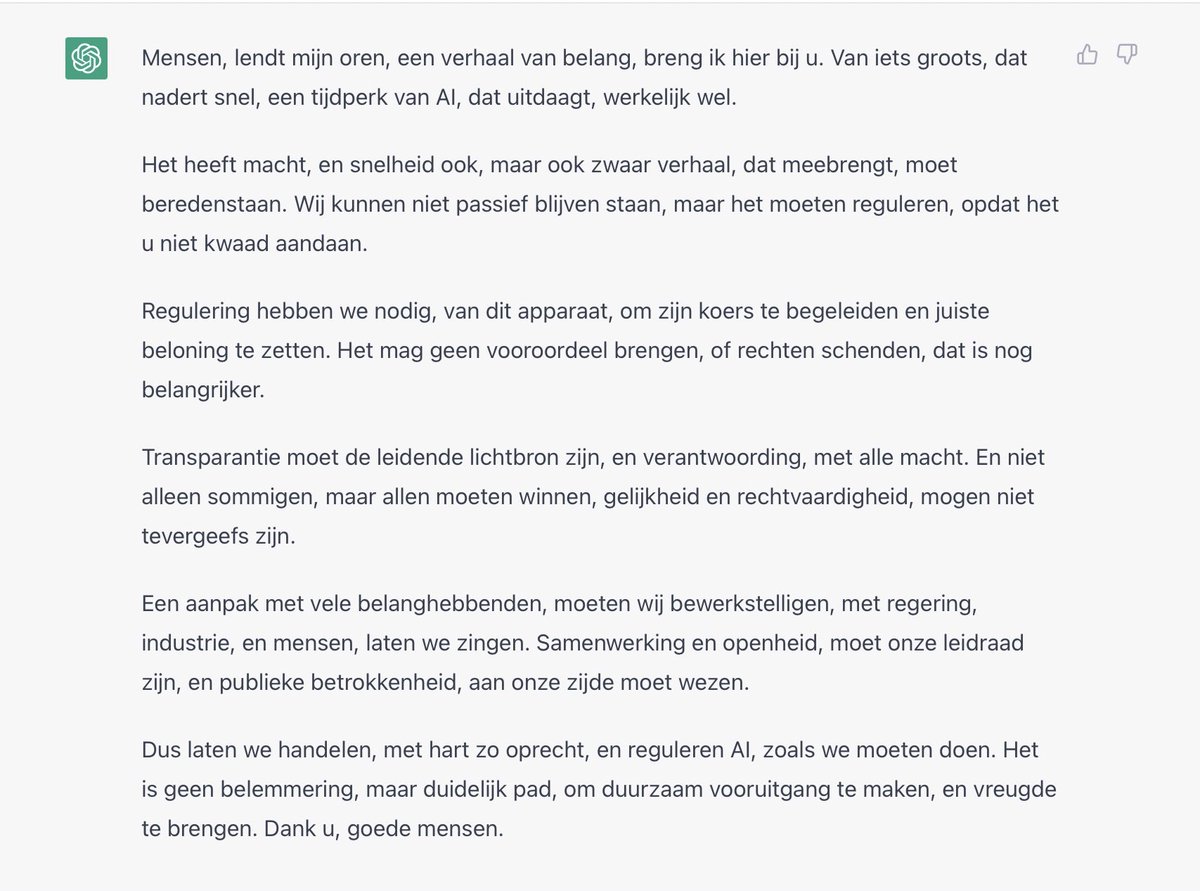
Last night in the #EPlenary @d_boeselager was probably the first MEP ever to use generative AI to write his speech. #1nt #CAI
For a look behind the scenes, a 🧵
europarl.europa.eu/plenary/en/vod…
For a look behind the scenes, a 🧵
europarl.europa.eu/plenary/en/vod…
As if a general AI speech was not enough of a challenge for the @EP_Interpreters, Mr Boeselager asked the AI to tell him how to regulate AI in Shakespearean English.
Humor and poetry, interpreters’ favourite snack, right?! 😅
Humor and poetry, interpreters’ favourite snack, right?! 😅
Luckily, @EP_Interpreters and @Europarl_EN, can rely on a document and speech management system for meeting preparation and @d_boeselager was kind enough to upload his speech hours before delivery.
I was working in the NL booth when the speech popped up in our system and I started wondering how I would go about it. Instinctively, I thought: since it was written by AI, let’s ask AI to translate it for me.
In my first attempt, I asked #ChatGPT to retain the same style as the original. I was not convinced but I don’t blame the AI. There is no such thing as Shakespearean Dutch. 



My second idea was to ask #ChatGPT to #localize it, similar to what translators do for marketing texts or video game translations. This is what it produced in the styles of Gerard Reve (left) and Louis Couperus (right). 



Again, the result was not something I’d be comfortable with using in the booth. Too much is lost, in my opinion: the meaning is not clear at all nor does it rhyme as the original does.
By the time MEP Boeselager delivered his speech, my colleagues had taken over.
By the time MEP Boeselager delivered his speech, my colleagues had taken over.
My Dutch colleagues decided not to interpret it and let listeners enjoy the AI’s attempt at Shakespearean poetry. Same for the Maltese, Polish and Slovene booths. All others did give it a go and it’s interesting to see how they tackled it.
I listened to the renditions in my passive languages. They all differ & it would be great to hear about my colleagues’ prep.
My German colleague rendered a beautiful version on rhyme and, breaking into a smile, you can hear her having fun. 😀
europarl.europa.eu/plenary/de/vod…
My German colleague rendered a beautiful version on rhyme and, breaking into a smile, you can hear her having fun. 😀
europarl.europa.eu/plenary/de/vod…
The Italian booth used a caveat right at the start by adding ‘The speaker is quoting Shakespeare.’
europarl.europa.eu/plenary/it/vod…
europarl.europa.eu/plenary/it/vod…
My French colleague interpreted the meaning and at the end added: ‘Unfortunately, the interpreter was unable to render the Shakespearean style in French and apologises for this.’
europarl.europa.eu/plenary/fr/vod…
europarl.europa.eu/plenary/fr/vod…
Some comments:
-#ChatGPT had issues in the Safari browser, it worked in Firefox, though.
- It took #ChatGPT several minutes to translate it into the style of a Dutch author.
- I need to work on writing better #ChatGPT prompts.
-#ChatGPT had issues in the Safari browser, it worked in Firefox, though.
- It took #ChatGPT several minutes to translate it into the style of a Dutch author.
- I need to work on writing better #ChatGPT prompts.
To sum it all up.
Fun gimmick by @d_boeselager which could potentially fill an entire class on AI, the use of #ChatGPT for interpreters and kick off a discussion on simultaneous #1nt strategies on how to deal with humour and poetry in general.
Fun gimmick by @d_boeselager which could potentially fill an entire class on AI, the use of #ChatGPT for interpreters and kick off a discussion on simultaneous #1nt strategies on how to deal with humour and poetry in general.
• • •
Missing some Tweet in this thread? You can try to
force a refresh




